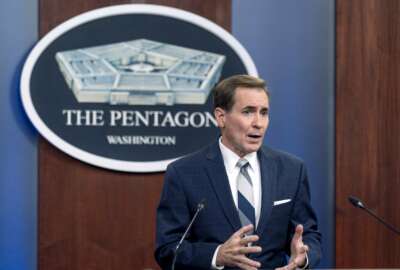Pentagon loosens some of its COVID-19 restrictions
Also in today's Federal Newscast, the Postal Service expects to raise mail prices in January 2023.
Best listening experience is on Chrome, Firefox or Safari. Subscribe to Federal Drive’s daily audio interviews on Apple Podcasts or PodcastOne.
- The Defense Department is slowly loosening some of its COVID-19 restrictions. The Pentagon is relaxing some of its COVID restrictions and entrenching others. New policy said employees must self-screen for symptoms before entering Defense Department buildings. Those who are feeling sick must stay home. However, close contacts of people infected with COVID no longer have to quarantine, if they are up-to-date on vaccinations. Also, the chief of U.S. Transportation Command now has the authority to waive travel-related COVID requirements to protect and sustain the joint force on a global scale. Finally, DoD employees may be reimbursed for traveling for work, which is related to testing.
- On Tuesday, President Joe Biden signed a $280 billion package to give a boost to the domestic semiconductor industry and scientific research. The CHIPS and Science Act would also create a National Secure Data Service to give researchers greater access to federal data. The bill sets aside $9 million for every fiscal year from 2023 through 2027.
- The Navy’s Installation Command Headquarters, Fleet and Family Support Center is trying to help sailors and their spouses transition into government employment. The center is holding a federal hiring summit in mid-August. Hiring officials from the departments of Veterans Affairs, Agriculture and other agencies will be in attendance. Officials will also hold educational sessions on hiring programs.
- The Postal Service expects to raise mail prices again this January. The Postal Service is starting to see the impact of major reform legislation on its finances, but said higher mail prices in January are needed to dig itself out from long-term financial problems. Postmaster General Louis DeJoy said USPS is currently looking at $60-70 billion in losses by 2030. He said that would quickly wipe out its $20 billion cash balance, unless action is taken. “We must deal with the reality of our financial status and the impact inflation will have on our improvement strategies,” DeJoy said. (Federal News Network)
- Marine Gen. Michael Langley has officially taken charge of the U.S. Africa Command. The first African American Marine four-star general is now the top U.S. commander for Africa, as of yesterday. The command has about 7,000 troops across Africa. (Federal News Network)
- Submissions are open for this year’s GSA Design Awards. The government’s landlord is bringing back the honor, which recognizes building projects that represent the next generation of federal real estate and design. Award categories include architecture, art, conservation, construction, engineering, landscape architecture, and urban design. Submissions are due on Aug. 22.
- Agencies got marching orders for how to prioritize their 2024 budget requests. Agency discretionary budget requests for fiscal 2024 should run the gamut of the Biden administration’s management priorities from equity and diversity to customer experience to the federal workforce. There are requirements in the 2024 budget guidance from the Office of Management and Budget to continue to build talent teams to prepare for the future of work by reducing or consolidating office space. And there is an entire appendix on combatting climate change through investments. OMB, which released the guidance in early July, said the development process will prioritize relying on evidence when assessing budget justifications. OMB said agencies must submit their 2024 requests by Sept. 12. (Federal News Network)
- The Cybersecurity and Infrastructure Security Agency’s vulnerability disclosure policy platform (VDP) reached the one-year mark and its impact is being felt across the government. CISA said in the first year, the platform received more than 3,600 reports from researchers of cyber vulnerabilities. CISA said the VDP is improving transparency and collaboration in the public and private sectors, as it helps participating agencies benefit from timely reporting that, in turn, facilitates prompt remediation.
- The federal security clearance reform initiative continues to chug along. The Defense Counterintelligence and Security Agency (DCSA) now has nearly three million federal employees and contractors enrolled in the latest version of continuous vetting. That’s just one of the milestones DCSA and other lead agencies recently completed as part of the Trusted Workforce 2.0 initiative. A quarterly update shows agencies also issued new adjudicative guidance in June. Future developments include unveiling a new personnel vetting shared services catalog, and drafting changes to the Standard Form-86.
- President Joe Biden signed a bill into law this morning that expands health benefits to veterans exposed to toxic burn pits. The House passed the first version of the bill in March with the Senate passing it last week. It’s expected to cost $280 billion over 10 years and covers veterans of Iraq and Afghanistan, as well as providing aid to Vietnam War veterans exposed to Agent Orange. (Federal News Network)
- The Department of Health and Human Services is looking to add staff and resources for a new research office. HHS established the “Office of Long COVID Research and Practice” to study the long-lasting form of COVID-19. The department’s assistant secretary for health will oversee the office and its research.
- The Department of Veterans Affairs has responded to lawmakers’ concerns over compliance with website accessibility standards. VA Secretary Denis McDonough said the agency is working to reduce duplicative online content, and limit web editors’ access only to what they need. The VA also plans to conduct scans of highly used webpages, like the updated VA.gov and the My HealtheVet platform. The secretary’s letter responds to concerns from the Senate Special Committee on Aging, which is looking into accessibility of federal web platforms.
- Naval History and Heritage Command’s new conservation and preservation site in Washington, D.C., gets a celebratory opening. The Naval History and Research Center had its ribbon cutting at the Washington Navy Yard on Monday. The project broke ground two years ago and is comprised of two former ordnance factories and warehouses, which were refurbished into a single two-floor structure. The Center houses Naval History and Heritage Command’s Navy Art Collection and Underwater Archeology Branch.
- The National Security Agency is aiming to expand its marquee cybersecurity competition. More than 5,000 people at 600 academic institutions have participated in the Codebreaker Challenge since it launched in 2013. This year, the NSA wants to double those numbers. The 2022 Codebreaker Challenge, which kicked off earlier this week, involves solving a ransomware attack. The NSA hopes that increasing participation in this year’s challenge will encourage more individuals to pursue a career in cybersecurity.
Copyright © 2025 Federal News Network. All rights reserved. This website is not intended for users located within the European Economic Area.
Peter Musurlian
Peter Musurlian is a producer at Federal News Network.
Follow @PMusurlianWFED
Related Stories
U.S. Army Reserve response to COVID-19: a conversation with Charles Luckey
Related Topics
All News
burn pits
Codebreaker Challenge
Covid-19
Cybersecurity and Infrastructure Security Agency
Defense
Defense Counterintelligence and Security Agency
Defense News
Department of Health and Human Services
Federal Drive
Federal Newscast
General Services Administration
hazardous chemicals
Joe Biden
Louis DeJoy
Management
Michael Langley
My HealtheVet
National Security Agency
Naval History and Heritage Command
Office of Management and Budget
Pentagon
Postal Service
security clearance process
social distancing
Tom Temin
U.S. Africa Command
Workforce






